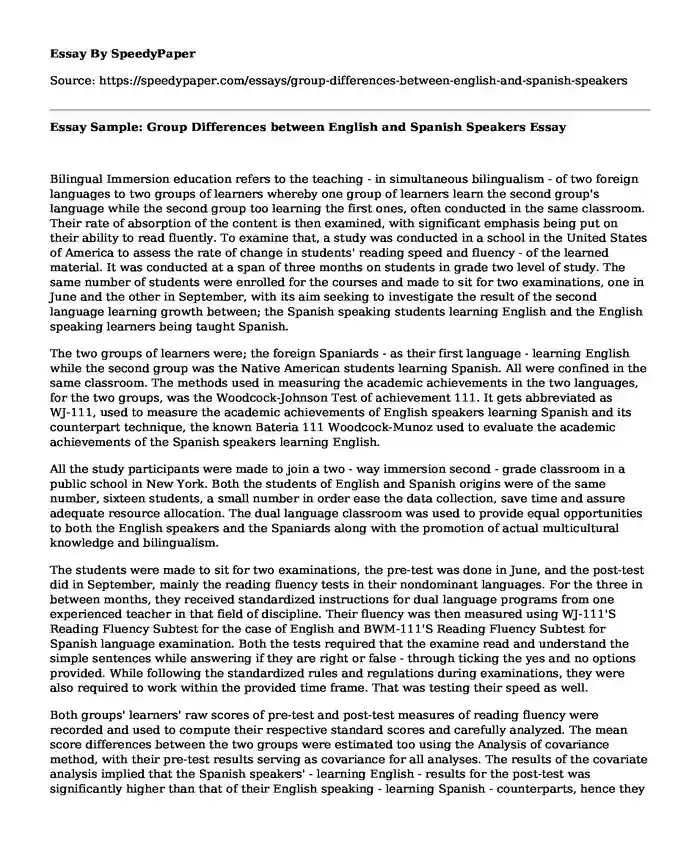Bilingual Immersion education refers to the teaching - in simultaneous bilingualism - of two foreign languages to two groups of learners whereby one group of learners learn the second group's language while the second group too learning the first ones, often conducted in the same classroom. Their rate of absorption of the content is then examined, with significant emphasis being put on their ability to read fluently. To examine that, a study was conducted in a school in the United States of America to assess the rate of change in students' reading speed and fluency - of the learned material. It was conducted at a span of three months on students in grade two level of study. The same number of students were enrolled for the courses and made to sit for two examinations, one in June and the other in September, with its aim seeking to investigate the result of the second language learning growth between; the Spanish speaking students learning English and the English speaking learners being taught Spanish.
The two groups of learners were; the foreign Spaniards - as their first language - learning English while the second group was the Native American students learning Spanish. All were confined in the same classroom. The methods used in measuring the academic achievements in the two languages, for the two groups, was the Woodcock-Johnson Test of achievement 111. It gets abbreviated as WJ-111, used to measure the academic achievements of English speakers learning Spanish and its counterpart technique, the known Bateria 111 Woodcock-Munoz used to evaluate the academic achievements of the Spanish speakers learning English.
All the study participants were made to join a two - way immersion second - grade classroom in a public school in New York. Both the students of English and Spanish origins were of the same number, sixteen students, a small number in order ease the data collection, save time and assure adequate resource allocation. The dual language classroom was used to provide equal opportunities to both the English speakers and the Spaniards along with the promotion of actual multicultural knowledge and bilingualism.
The students were made to sit for two examinations, the pre-test was done in June, and the post-test did in September, mainly the reading fluency tests in their nondominant languages. For the three in between months, they received standardized instructions for dual language programs from one experienced teacher in that field of discipline. Their fluency was then measured using WJ-111'S Reading Fluency Subtest for the case of English and BWM-111'S Reading Fluency Subtest for Spanish language examination. Both the tests required that the examine read and understand the simple sentences while answering if they are right or false - through ticking the yes and no options provided. While following the standardized rules and regulations during examinations, they were also required to work within the provided time frame. That was testing their speed as well.
Both groups' learners' raw scores of pre-test and post-test measures of reading fluency were recorded and used to compute their respective standard scores and carefully analyzed. The mean score differences between the two groups were estimated too using the Analysis of covariance method, with their pre-test results serving as covariance for all analyses. The results of the covariate analysis implied that the Spanish speakers' - learning English - results for the post-test was significantly higher than that of their English speaking - learning Spanish - counterparts, hence they were able to learn English better than the Americans, likely due to favorable environment and culture change for Spaniards.
Cite this page
Essay Sample: Group Differences between English and Spanish Speakers. (2022, Apr 27). Retrieved from https://speedypaper.net/essays/group-differences-between-english-and-spanish-speakers
Request Removal
If you are the original author of this essay and no longer wish to have it published on the SpeedyPaper website, please click below to request its removal:
- Law Essay Example: Fourteen Amendment Reconstruction
- Problem Court Essay Example
- Research Design Methodology Used in Carrying Out the Study of Airbnb. Free Essay.
- Free Essay on Union in Peril: The Crisis over British Intervention in the Civil War by Howard Jones
- Media and Pop Culture - Free Essay for Everyone
- Communication Skills Essay Sample: Trump's Effectiveness in the Speech He Gave in Phoenix
- Vigilantism in America, Free Example of Literature Review
Popular categories





